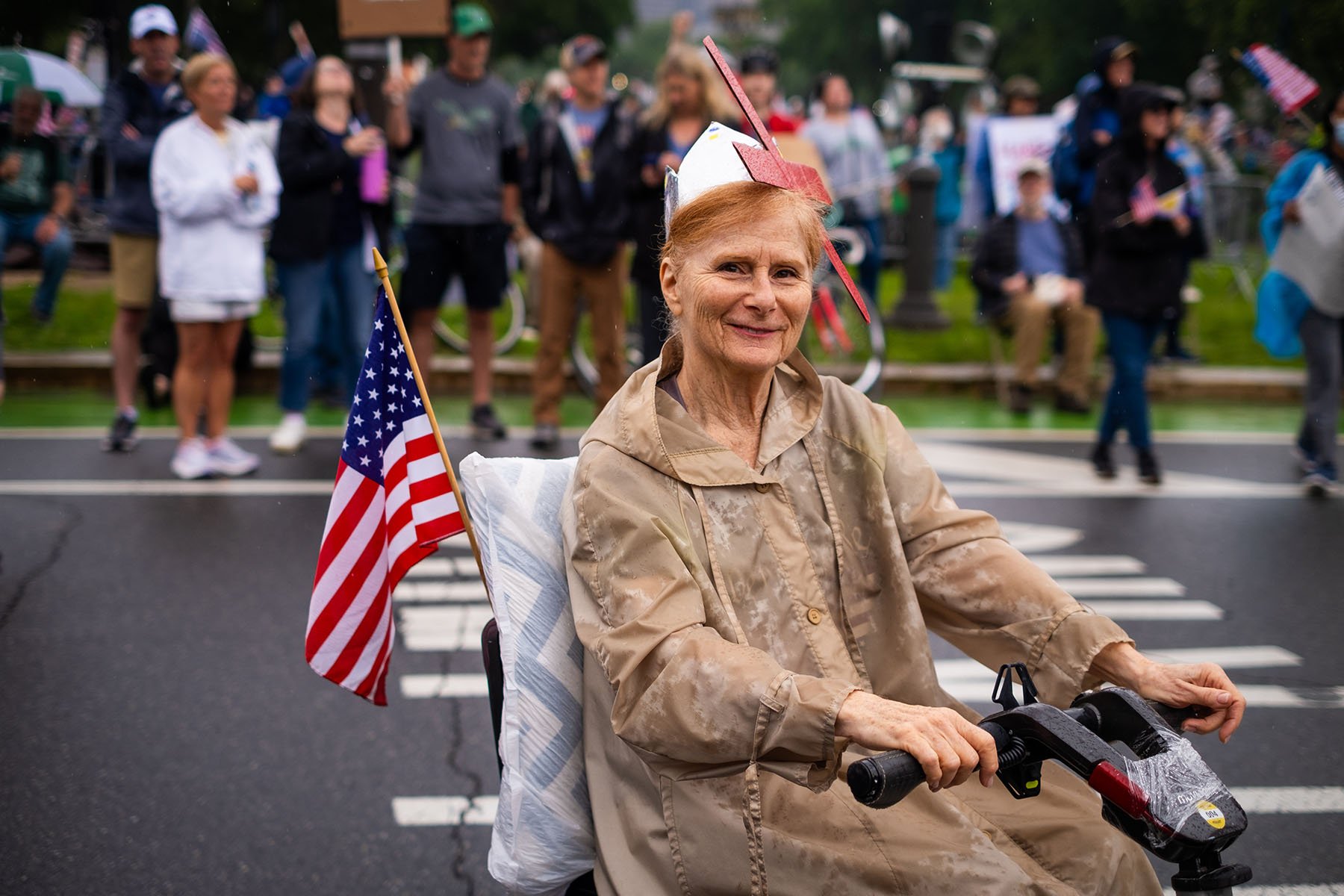SPRINGFIELD, OHIO — The 2017 Women’s March was Barbara Hartwick’s first-ever political protest. She drove from the exurban community where she lived at the time to downtown Cincinnati, a left-leaning city of 300,000 people that anchors the otherwise conservative region. Still, Hartwick said, she felt too nervous to carry a sign or join in most of the crowd’s chants.
Eight years later, having watched President Donald Trump’s political ascent, Hartwick, 63, has gone from a “hesitant” to an enthusiastic protester. When she joined the several hundred people outside Springfield’s city hall on Saturday — among them many retirees who, like her, took to the streets to oppose Trump’s agenda — she held up a sign that read: “Let the wild rumpus start!” She was inspired by the crown-wearing young boy in Maurice Sendak’s children’s book, “Where the Wild Things Are.” It was, she said, a nod to the “No Kings” nationwide rallies.
Hartwick, a retired teacher, said she had “misconceptions” back in 2017 about what protests were like; she had never been politically active beyond voting. The march revealed to her “the camaraderie, the community of people there.” The crowd was “generally peaceful and positive” as they protested and it helped Hartwick realize that other women like her were also frustrated and disappointed with the direction of the country. She discovered that community spirit again Saturday in Springfield, the conservative-leaning city that Vice President JD Vance put on the map during the presidential campaign, when he made false accusations against the Haitian migrants legally living there to make the case for today’s militaristic immigration crackdown.
Protests, Hartwick said, “give people hope.”
Women led prominent protests during Trump’s first term against his presidency writ large, his treatment of women, his now-fulfilled pledge to appoint Supreme Court justices that would overturn the federal right to abortion, his family separations policy at the U.S. border and more. But while Black women have voted against the president in every election, White women voted for Trump in 2016, backed him again at the ballot box in 2020 and then a third time in 2024, according to exit polls. Democratic former Vice President Kamala Harris actually lost support from women overall last year as compared to 2020 across all age groups except one: those over 65.
Headed into Saturday’s protests, the only age group across all genders and races with a lower opinion of Trump than 65+ voters was voters under the age of 30, according to a weekly tracking poll conducted by YouGov for the Economist magazine.
Rural America is older than urban America, so in Saturday’s small-town and suburban protests, the graying nature of the coalition in the streets protesting Trump was visible enough that it caught the attention of local news outlets. The St. Louis Post-Dispatch posted a video of “senior citizens and others” at a protest in the moneyed suburb of Clayton, Missouri. West Virginia Public Radio reported that at a demonstration in Charleston, the state capital, “all ages were represented, but a large contingent of older West Virginians braved the sun and humidity to attend.” Trump had a higher margin of victory in the largely rural state than nearly any other.
Longtime climate activist Bill McKibben, who founded the Third Act organization several years ago to build a community of Americans 60 and older to fight climate change and protect democracy, wrote a recent Los Angeles Times op-ed with Akaya Windwood, an adviser for the group, under the title: “Why older Americans are Trump’s biggest nightmare.”
A research team led by American University’s Dana R. Fisher surveyed the host organizers of Saturday’s events and found that “consistent with the Resistance to the Trump administration during its first term, the majority of hosts and participants were female, predominantly White, and highly educated.” What has changed since the president’s first term, Fisher told The 19th, is that “the people in the streets are older than they were back in the first administration.”
Fisher’s team’s preliminary findings showed that the median age on Saturday for participants in Philadelphia was 36 years old while the median age for protest event hosts nationwide was 67. Their field research in the first months of Trump’s second term shows that participants and organizers protesting the president are more likely to be women, more likely to be older and more likely to be White than participants and organizers of other recent protest movements.
The 2017 Women’s March, held the day after Trump’s first inauguration, was, at the time, the largest single-day protest in U.S. history — between 3.2 million and 5.2 million people, or 1 to 2 percent of the country’s population, participated in more than 400 demonstrations nationwide. Saturday’s “No Kings” protests aimed for the lofty goal of about 12 million people, or about 3.5 percent of the country’s population, a number that reflects the level of participation that political scientists say is necessary to overcome a dictator or authoritarian leader.
Organizers sought to do that by dispersing protests across more than 2,000 locations, many in places where public demonstrations are rare. Cities like Philadelphia and Chicago reported some of the largest crowds, but there were also well-attended events in small towns and mid-sized cities in politically conservative states like Ohio, Missouri, Tennessee and West Virginia.
Jeremy Pressman, co-director of the Crowd Counting Consortium, a joint project of Harvard Kennedy School and the University of Connecticut, said it would be weeks before they can fully tally nationwide attendance. But, he told The 19th by email, it “looks very likely it was one of the largest days of protest in U.S. history.”
It didn’t surprise Hartwick that older Americans, and especially older women, are souring on the president, whose administration has fired tens of thousands of federal workers and shuttered federal programs under the banner of anti-diversity equity and inclusion efforts. Plus, Republicans in Congress are debating legislation that would finance tax breaks for the wealthy by making deep cuts to the Medicaid health insurance program for lower-income Americans and nutrition programs on which many seniors rely.
An aphorism in U.S. politics is that Americans become more conservative as they age; many older women who spoke to The 19th on Saturday noted that it isn’t a conservative approach, in the “small-c” sense of the word, to dismantle government programs and institutions and to upend democratic norms.
“We don’t want to go back. It took a movement to get the right to vote. It took a movement to get Civil Rights. I’ve never in my lifetime lived when rights are taken away — until now,” Hartwick said, lamenting that to younger Americans, Trump’s policies and intensely divided politics likely seem normal.
Also at the Springfield protest was Joan Justice, 84, holding a sign that said: “If there’s money for a parade? Then there’s money for Medicaid!” “I have friends who are in nursing homes and I know the money is running out and it really scares me,” Justice, also a retired educator, told The 19th of the program that covers long-term residential care for lower-income seniors because Medicare, the health insurance program for elderly Americans at all income levels, does not.
Another “No Kings” protest in nearby Middletown, Ohio, a deeply conservative town of about 50,000 where Vance was raised by his grandparents, drew more than 400 and skewed older than Springfield. Among the people gathered at a busy intersection near a large supermarket, hardware store and a panoply of national restaurant chains was a 64-year-old woman who asked to be identified by her first name only, Rebecca, because, she said, she knows Trump opponents who have faced harassment. She was attending her first protest and said, “I want to start getting more active, I want to start writing my congressmen. My parents were Republicans and they would be appalled.”
Standing nearby was Nannette, 74, who requested her surname be withheld for the same reason. She said that “Middletown is a small town, but I’m doing everything I can think of,” attending the April protests against cuts to the federal government that preceded those held on Saturday. “I was a lifelong Republican, and I tried to hold on, but January 6th was the end,” she said. When she sends mail, she puts her stamps with the American flag upside down as a subtle signal of distress.
Hartwick said she sees a recent version of her past self in these older women who are overcoming fears about public demonstrations to protest the president, so she is “finding little opportunities to let people know it’s okay to not like what’s going on right now.”
Just last week, Hartwick said, she was buying posterboard at her local Kroger supermarket when a woman in her late 60s or early 70s asked if she was making signs for a garage sale. “I said ‘no’ and she said ‘oh, what is it for?’ I said: ‘A protest.’ And she whispered: ‘The No Kings protest?’ I said ‘yes.’ And then she said: ‘Good luck.’”
“People might be looking for someone else who feels the way they do because they don’t see it in their own community,” Hartwick said.





